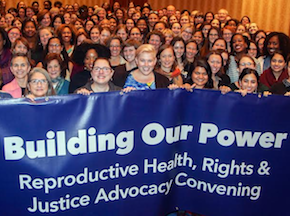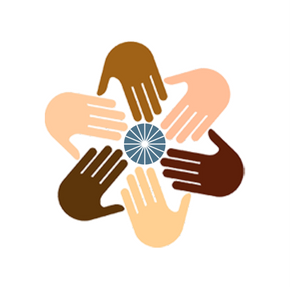Mar 20

You can Support Project Access today!
Newsletter/January 2017
 In 2016, with all our staff and board, the Reproductive Health Access Project thought deeply about two interrelated topics: 1) reproductive justice and 2) policy and advocacy.
In 2016, with all our staff and board, the Reproductive Health Access Project thought deeply about two interrelated topics: 1) reproductive justice and 2) policy and advocacy.
We agreed that while our organization is dedicated to issues of reproductive health, the principles of reproductive justice underlie our mission, inform our work, and shape our organizational priorities and strategy. We also realized that we have been doing a lot more policy and advocacy work than we originally thought and are committed to stepping up our involvement in policy and advocacy activities that would further our mission of ensuring everyone has access to reproductive health care.
The lead-up to the 2016 election was an opportunity for our movement to articulate a positive, pro-active, expansive reproductive health, rights, and justice agenda. With the help of board member Vicki Breitbart, RHAP was an active member of a broad coalition of organizations that developed this agenda for the incoming administration. We participated in several subcommittees, attended in-person planning/coordinating committees in Washington, DC, and helped determine the coalition’s final set of priorities. We came away from the process feeling that RHAP’s contribution was unique and valuable. We also left inspired and emboldened at the possibilities the future could hold.
After the election, the coalition came together again to reaffirm our commitment to our original agenda and to plan our strategy to accomplish this agenda. You can read our collective statement here. In the coming days, months, and years, RHAP’s goal is to remain vigilant, stay connected, and take action on critical issues where we can make a difference.
We promise to keep you engaged and share opportunities for action with you. Standing together we can make a difference.
 Many of the clinicians the Reproductive Health Access Project (RHAP) often work with face barriers to providing comprehensive reproductive health care due to religious discrimination from institutions, co-workers, administrators, and lawmakers. This is why RHAP is proud to be a part of the Coalition on Liberty & Justice (CLJ), an alliance of faith-based and secular organizations working together to ensure that public policy protects the religious liberty of everyone regardless of personal beliefs. In light of the recent nomination of Representative Tom Price as the next Secretary of Health and Human Services, we must fight harder than ever to ensure that religion does not have a place in public policy and law.
Many of the clinicians the Reproductive Health Access Project (RHAP) often work with face barriers to providing comprehensive reproductive health care due to religious discrimination from institutions, co-workers, administrators, and lawmakers. This is why RHAP is proud to be a part of the Coalition on Liberty & Justice (CLJ), an alliance of faith-based and secular organizations working together to ensure that public policy protects the religious liberty of everyone regardless of personal beliefs. In light of the recent nomination of Representative Tom Price as the next Secretary of Health and Human Services, we must fight harder than ever to ensure that religion does not have a place in public policy and law.
In 2012, Rep. Price, a physician, was asked by ThinkProgress to respond to women who can’t afford birth control without insurance coverage. Dr. Price, who has adamantly opposed the Affordable Care Act (including the mandate requiring employers’ insurance plans to cover birth control for employees), replied, “Bring me one woman who has been left behind… there’s not one. The fact of the matter is, this is a trampling of religious freedom and religious liberty in this country. The president does not have the power to say that your First Amendment rights go away. That’s wrong.” In addition to being factually inaccurate, this statement actually infringes on our First Amendment rights as Americans and is very troubling as we look ahead to the coming years.
Monday, January 16 is Religious Freedom Day (coinciding this year with Dr. Martin Luther King, Jr Day), a national commemoration of the 1786 signing of the Virginia Statute for Religious Freedom. This Statue was the precursor to the First Amendment, which protects the religious freedom of all Americans—both those who identify as religious and those who do not identify as religious. Religious Freedom Day has commonly been embraced by religious conservatives as a way to share harmful religious narratives with the public. These narratives often become laws and policies that impose one religious viewpoint on all, restricting access to reproductive health care. Dr. Price’s nomination, and the anti-choice incoming administration, only underscores the importance of advocating for the rights of clinicians to practice safely and openly, and for the rights of people everywhere to access reproductive health care free from religious bias and discrimination.
From January 9-16 the Coalition on Liberty & Justice will host a social media campaign using the hashtag, #religiousfreedomis. Keep an eye on RHAP’s social media pages for more details on how you can participate!
 If there is a silver lining to the challenges that lie ahead, it is the satisfaction of knowing that more people are willing to mobilize and fight the injustices the incoming administration may try to impose on the American public. We have seen the impact of this increased engagement. Since the election more individuals like you have signed up to volunteer with us. We now have nearly 200 volunteers signed up in 25 states and Canada! The entire team at the Reproductive Health Access Project promises to continue advocating for reproductive health as a human right so we can make sure we fulfill our mission of training clinicians and making it accessible across the country.
If there is a silver lining to the challenges that lie ahead, it is the satisfaction of knowing that more people are willing to mobilize and fight the injustices the incoming administration may try to impose on the American public. We have seen the impact of this increased engagement. Since the election more individuals like you have signed up to volunteer with us. We now have nearly 200 volunteers signed up in 25 states and Canada! The entire team at the Reproductive Health Access Project promises to continue advocating for reproductive health as a human right so we can make sure we fulfill our mission of training clinicians and making it accessible across the country.
We are happy to announce that we are going to pilot a new program to help us engage and make the most of our volunteers’ skills. 2017 will bring an array of opportunities for you to get involved, learn more about the movement, and make a difference – no matter how big or small the impact. Our new volunteer program, led by our operations associate Naomi Legros, kicks off in the first quarter of the new year. Sign up today to get more information!
 Thank YOU!
Thank YOU!
We Asked. You delivered. You helped provide access, support, but most importantly, hope.
Because of you our 2016 End-of-Year campaign was a huge success. In this new year, we are thankful for your generosity and commitment to spreading access to reproductive health care. In 2016, we were able to expand access to abortion, contraception, and miscarriage care by increasing support to pro-choice clinicians in nearly every state in the country. We supported five more organizations to provide comprehensive treatment of early pregnancy loss, we supported five more fellows in New York and Boston, we translated our patient education materials into Chinese, and created new materials on miscarriage and preconception care. With your support, more clinicians are now able to provide comprehensive reproductive health care in their communities.
In 2017 your support will help primary care physicians, nurse practitioners, midwives, and physician assistants to work together to identify and overcome restrictions to abortion, contraception, and miscarriage care. In the coming months, our Network will be launching on-the-ground efforts in six more states: Colorado, Illinois, Maine, North Carolina, Ohio, and Washington.
YOUR gift in action:
WE are spearheading change and can’t do it without YOU.
On behalf of the 1,200+ primary care clinicians in our Network – and their patients – thank you for supporting us in the fight to expand access to reproductive health care.
 I saw a number of women in our clinics for abortions in the past few days. A 22-year old got squeezed into my regular schedule with a note by the medical assistant that just read, “Needs a sonogram to see how far she is.” It turns out, she had just has a positive pregnancy test the night before and was still a bit shell-shocked. The ultrasound showed a tiny pregnancy, not even 6 weeks, and I gave her my usual offer of “We’re here for you, whatever you decide.” She left the office with RHAP’s Early Abortion Options handout, and she came back to the clinic two hours later asking for the abortion pill. We talked through the process, I answered her questions, she swallowed the mifepristone and took the misoprostol tablets with her. She was just really relieved to be able to get back to her usual life.
I saw a number of women in our clinics for abortions in the past few days. A 22-year old got squeezed into my regular schedule with a note by the medical assistant that just read, “Needs a sonogram to see how far she is.” It turns out, she had just has a positive pregnancy test the night before and was still a bit shell-shocked. The ultrasound showed a tiny pregnancy, not even 6 weeks, and I gave her my usual offer of “We’re here for you, whatever you decide.” She left the office with RHAP’s Early Abortion Options handout, and she came back to the clinic two hours later asking for the abortion pill. We talked through the process, I answered her questions, she swallowed the mifepristone and took the misoprostol tablets with her. She was just really relieved to be able to get back to her usual life.
The next day, we took a walk-in from our urgent care doctor. The patient was 14 and had a positive pregnancy text. She definitely did not want to be pregnant and did not want any kind of procedure. She decided to take the abortion pill and stay with her auntie the next day for her cramping and bleeding. That same day, we had a 35-year-old mother of six who had been told she had polycystic ovary syndrome and probably wouldn’t get pregnant again. However, she did become pregnant again and wasn’t happy about the prospect of one more. She’s still thinking about what she will do. Finally, a 19-year-old came in for the abortion pill after hearing about our clinic from a cousin.
None of these patient visits were particularly charged with angst or difficult- they were all just a part of the medical care that we offer day in and day out. But in my heart, I keep worrying that this basic, everyday care will be taken away from us, and from our clients. These women’s lives will be different, and probably not in the way they want them to be — perhaps for some women more drastically than others. But overall, not having this kind of care available will prevent women from having the futures they want.
It has been my dream to mainstream abortion care everywhere, making it part of normal and routine health care. Mifepristone makes abortion so amenable to primary care, and it’s really ideal when women can go to their neighborhood health centers (where they get all of their other health care) and take the medicines they need to get back for themselves the futures they want. We recently had a community training in medication abortion, teaching providers how to do medication abortion without mifepristone (the FDA approved abortion pill). I hope that it won’t come to this, but I do think it’s very important for us to all learn the alternative protocols and be prepared, especially as we face the challenges ahead.
Your gift allows us to train and support health care providers across the United States so they can offer patients compassionate and comprehensive care.
Mar 20
